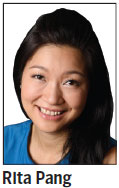We must realize there are some things money can't buy
Updated: 2014-06-09 07:10
By Rita Pang(HK Edition)
|
|||||||||
Have you gone to Disneyland with your children recently? If so, you have likely faced long queues (i.e., averaging 40 minutes per ride) which may tempt you to buy the Fast Pass to skip the line. Would you?
I am a working mother with three girls, and our family is often stretched with time. I can afford the Fast Pass (about HK$3,000 for a family of up to six people over a three-hour period), yet something has always held me back. Each time, I ended up staying in line.
Professor Michael J. Sandel addressed this issue brilliantly in his book What Money Can't Buy. In simple but elegant prose, he provides a framework that can be applied to both simple questions (e.g., should we allow people to pay their way?) and complex issues (e.g., should we allow people to sell body parts, or to have harmful materials injected into their bodies as part of medical tests?).
Markets, and market values, have come to govern our lives. Almost everything has a price tag and is up for sale. But is this the way we want to live?
In the case of paying a price to jump the queue, Sandel cites "Shakespeare in the Park" in New York City as an example. Seats for this annual, civic event are free but limited. Consequently, a practice has developed where those who can afford it pay others to stand in line for them in order to get free tickets.

Economists would have no problem supporting such transactions - where both buyers and sellers are better off. Yet Sandel makes the point that markets can crowd out morals or social benefits that are worth preserving. In the case of Shakespeare in the Park, the nature of a free, civic event for the community at large is corrupted if the rich can pay their way to ensure they get seats without waiting in line. Should we, therefore, limit or outlaw such behavior? The answer is obvious.
We were all taught from childhood to "wait in line". But as we grow up, practices that go against this basic principle of fairness (such as Fast Pass or paying someone to wait in line for you) become commonplace and accepted. Sandel's book is a wake-up call for us to ask ourselves what are the values we ought to preserve. And what are the values that should not be aligned with market norms.
This year, winners of the 2014 Harvard Book Prize (awarded by the Harvard Club of Hong Kong) from 148 secondary schools in Hong Kong were awarded Sandel's What Money Can't Buy. It is the 10th year that the Harvard Club of Hong Kong has awarded these prizes, and in honor of the anniversary, the Harvard Club has asked winners to write about "what money can't buy" in Hong Kong. Student responses touched on values such as social and political harmony, compassion, empathy, a greener earth, and human connection. The essays made me consider the opposite, what money can and should be able to buy in Hong Kong - particularly in regard to heritage conservation.
In Hong Kong, I hope to see fewer symbols of profligate government spending and more modest reflections on our past. These can teach us about our roots and history. In the context of the conservation of our heritage, we can't expect the government to pay the market price valued by property owners of historic sites. There are bound to be demolitions of historic sites that form the core of our collective experiences. And yes, sadly, I have seen far too many buildings that carry a precious chapter of our history being torn down, particularly in the last two decades.
That said it was encouraging to see the government recently taking a more proactive role (compared with previous administrations) by negotiating deals with the private sector which appeal to both conservation and commercialism. An example is the Shek Kip Mei Estate Mei Ho House (HK's first public housing complex) which was re-made into a youth hostel and a lifestyle museum featuring rooms preserved as they were originally. If you grew up in the 1950s to 1970s, you will remember the H-shaped public housing estates. This chapter of our history reminds many of us of our roots - our ancestors flooding in from the mainland to Hong Kong after World War II ended. This is part of Hong Kong's past and gives our great city its soul and character.
If we can learn from history and from those who came before us, just as we learn to humbly wait our turn, Hong Kong will become a better place for all of us.
The author is involved in commercial retail properties investments at Bridgeway Advisors Group. She is the co-president of the Harvard Club of Hong Kong and the co-chair of the 2014 Harvard Book Prize Committee.
(HK Edition 06/09/2014 page1)